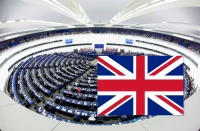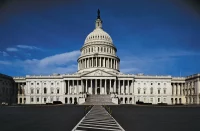The Greek media have published a response by the hierarch of the Constantinople Patriarchate, Elder Metropolitan Apostolos of Derkoi, to an appeal by monks of the Ukrainian Orthodox Church to Patriarch Bartholomew of Constantinople, in which they urge him to reconsider his recognition of the schismatic Orthodox Church of Ukraine (OCU). Basically, he has told them to shut up. “Put your hands and mouth down from the Successor of those who made you Christians!” Elder Metropolitan Apostolos of Derkoi cries out.
The theological interpretation of the phrase “to make Christian” should be left to the conscience of this hierarch. However, the Phanar’s sense of self as a kind of factory that has been granted a patent for the manufacture of Christians is typical. Now, the “manufacturer” is asking its “products”, which have been relegated to the category of defective with a single stroke of the pen, to adopt “positions of humiliation and apprenticeship”. At least Orthodox Christians are not required to wear a sign saying “Made in Phanar” around their necks in place of a cross.
The hierarchs of the Phanar are forgetting one important detail: today’s Patriarchate of Constantinople is no longer the Ecumenical Church of the Great Constantinople, of the New Rome, of Tsargrad. Once upon a time, way back in the Middle Ages, Constantinople was the centre of the civilised world. To those living in the Eastern Roman Empire, the word “ecumene” meant the vast space that existed within its borders. Hence the lofty title “Ecumenical Patriarch”. The Church fell even before the Ottoman Turks seized Constantinople itself in 1453. As early as 1439, the Patriarchate of Constantinople became heretical by submitting to the Roman Pope and entering into the Florentine Union with the Roman Catholics. Only decades later, and already under Ottoman rule, did it return to Orthodoxy.

It was at exactly this time, in 1448, that the Russian Church far from willingly became autocephalous and the first in the whole Orthodox world, and Moscow became the Third Rome, the only free Orthodox power standing in defence of Orthodoxy. Unlike the Greek nationalist Phanariots, it has also never humiliated or belittled peoples.
In contrast, the Patriarch of Constantinople has recently been talking as if he has special prerogatives allegedly given to him by the Apostles, and he has no intention of entering into a dialogue about them. Such views have already led to unfortunate events in Ukraine, when unilaterally, contrary to the will of the Local Churches and without consulting them, Patriarch Bartholomew committed an anti-canonical act that provoked a schism in the Orthodox world.
In Orthodoxy, there has never been one supreme head for all the churches. This new “doctrine”, which is being actively pushed by Constantinople, is causing dissent in the local Orthodox churches. In addition, it has effectively brought the Orthodox–Catholic dialogue, which the Phanar is trying hard to use to inflate its primacy, turning it into something akin to the papal authority in the Roman Catholic Church, to a standstill.
A kind of overheating caused by excessive power ambitions can also be observed within the ranks of the Patriarchate of Constantinople itself. Many fellow hierarchs are displeased and disappointed by the “vociferous presence” of Elder Metropolitan Emmanuel of Chalcedon (Adamakis), who has recently been transferred from Paris to serve in Istanbul, in the Phanar.

The metropolitans in the Bosporus region are not happy with the high mobility of a hierarch who, in accordance with the typikon, is second in command. Patriarch Bartholomew holds him in high esteem and considers him capable of taking on a leading role in the patriarchate. However, this has turned the others against him. Most dissatisfied with the activities of the Metropolitan of Chalcedon are those belonging to the group of Metropolitan Dimitrios of the Princes’ Islands.
Metropolitan Emmanuel is a refined intellectual and graduate of the Catholic University of Paris who is an expert not only in post-modern theology, but also haute couture and fine perfumery. Did he want to leave Paris, which is practically his hometown, where, for the last two decades, he headed the Greek metropolis of France and, in fact, the whole of Europe? It’s a rhetorical question. Upon moving to Istanbul, he officially became second in command in the Patriarchate of Constantinople, and therefore the most likely successor to Patriarch Bartholomew (Arhondonis).
Patriarch Batholomew is 81, and there have been rumours for some time that he has serious health problems. Only God knows how much time he has left, but it is important to understand that, by this public action, the Phanar has given a clear sign to the entire Orthodox world. The succession from Arhondonis to Adamakis is secure. The ideology of liberal Renovationism, and, at the same time, the harsh expansion into the internal affairs of other local churches, is becoming the official line of the Phanar rather than the private business of the ageing first hierarch in Istanbul and his personal ambitions.
The fact is that, for many years, Metropolitan Emmanuel himself has not only been one of Patriarch Batholomew’s underlings, but also a fully independent ideologue of the Phanar. More precisely, he has been an ideologue of a movement, both liberal ecumenical and, at the same time, totalitarian towards the entire Orthodox world, that originated in the Patriarchate of Constantinople a long time ago, but that, until recently, was at least formally hidden by the rhetoric of “pan-Orthodox conciliarity”.
From here on out, everything becomes abundantly clear. Not only will the Phanar never give up its lawlessness in Ukraine, but Metropolitan Emmanuel himself was directly and personally involved in creating the false church of the OCU, and he will continue this policy against other churches, from the Church of the Czech Lands and Slovakia, whose autocephaly has been actively challenged by the Phanar in recent years, to any ancient patriarchate that dares to question the omnipotence of the hierarchs in Istanbul.
In this regard, it should be emphasised that the policy chosen by the Phanar is absolutely anti-canonical and basically heretical. Acceptance of the Arhondonis–Adamakis ideology is nothing short of a true betrayal of Orthodoxy.
The situation is inevitably compounded by the risk that the Patriarch of Constantinople’s reputation will be eroded if Metropolitan Emmanuel is elected to the post. The hierarchs’ and the congregation’s apparent lack of trust in him could rise sharply if additional publicity is given to an investigation into his involvement in the misuse of funds of the Metropolis of France, as well as the scandal surrounding the theft of church valuables worth around $1 million. Among other things, the investigation uncovered CCTV footage showing Emmanuel engaging in homosexual acts with alleged thieves – young men from a Paris escort agency invited to the Metropolis building by the hierarch himself.

Another candidate for the post of Patriarch of Constantinople – the head of the American archdiocese, Metropolitan Elpidophoros (Lambriniadis) – is also a highly controversial figure. His Kurdish origins, his previous clashes with the Turkish leadership and with President Erdoğan personally, who suspects him of links to Fethullah Gülen, and his proximity to the Biden administration could all prove serious obstacles to his nomination.
All things considered, and given the fact that Ankara’s position will be a determining factor in the appointment of the future patriarch, Emmanuel has the best prospects for leading the Patriarchate of Constantinople. The Turks are also more likely to prefer Adamakis because the existence of compromising material on him will allow them to manipulate the Phanar more effectively.
All this makes the Patriarchate of Constantinople even less independent and more susceptible to the influence of international politics, and the ambitions of its hierarchs are becoming a tool to address the far from ecclesiastical problems of both Turkey and the US.
So, which “universe” does the universal Ecumenical Patriarch rule?














Comments